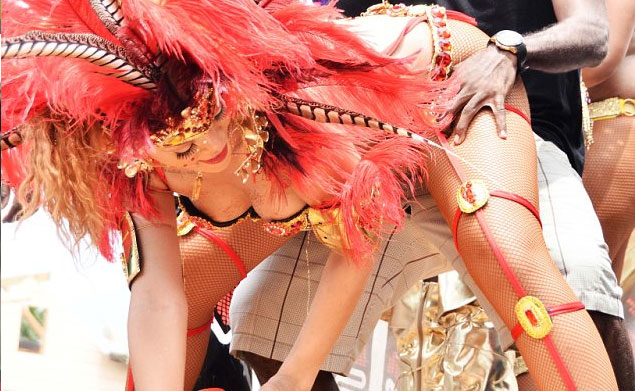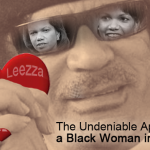I remember reading a brief article online about Rihanna’s recent appearance and participation in her country’s yearly Kadooment celebration and I was outraged at the media’s response. Some called her costumes and moves ‘scandalous,’ ‘raunchy’ and ‘overly sexual.’
‘Ignorance!’ I declared. To me, these responses are rooted in these people’s ignorance and their lack of knowledge about the roots and cultural celebrations and practices in the West Indies.
Being a proud West Indian who frequently participates in the yearly carnival celebrations dressed in costumes just as revealing as the one Rihanna wore and “getting on bad’ like she did when she danced, I just could not understand Western media’s outrage. Carnival and its celebrations is an integral part of West Indian life. A chance to play the role of someone we would otherwise not display publicly. A chance to liberate yourself and release all inhibitions. It’s good for the soul! Even the most religious and prude West Indians embrace and accept Carnival as a necessary part of life. If only the Western media was aware on this, maybe they would not have responded to Rihanna the way they did. However, I doubt that the possession of this knowledge would change their perceptions.
We saw the controversy develop around the ‘dutty wine’- a dance made popular by reggae dancehall culture. While some noted that the dance appears to be rooted in traditional West African fertility dances, others blasted it as a vulgar dance which exposes the scandalous nature of dancehall culture.
What I find interesting about African culture throughout the Diaspora is the pervasiveness of the freedom of sexual expression. Whether we are watching a National Geographic video, a rap video or a cultural celebration in the streets of the Caribbean, freedom of sexual expression is almost always present. In both the examples of the Caribbean and Africa, both women and men are just as free in their sexual expressions. On the hand, I have realized that in some rap videos, modern dancehall and hiplife videos, the displays of sexuality between men and women are a bit different. Often in these music videos, the women are put on display as sexual objects, while the men stand around drooling ‘flossing’ their jewelry, cars and other material possessions. While many of these videos arguable display women as sexual objects, in rooted Africa and some parts of the Caribbean, men are just as open about their sexual expressions. While I will reserve the topic of sexist ideology in these videos for a later discussion, the common theme the display of sexuality and freedom of sexual expression is always present.
I know that I have to be careful of where I am going with this since Africans and their descendants have fought long and hard to shed the troupe of being highly sexualized, heathenous savages – role that has been ascribed to us by colonialism in their mission to make us ‘civilized beings.’ However, we cannot deny that many of us appear to be very conformable with our bodies and sexuality. Many of us are probably this way because in many African tribes and cultures, the naked body is not viewed in highly ‘sexual’ way, but instead, the naked body is simply our physical manifestation of being- to put it simply, a natural organic part of the nature of things.
Could it be that in the Western world we are too consumed with equating the human body and the display of it with sex, rather than looking at it as just a physical expression and manifestation of self? Are we too conservative in our view of the human body and its meaning in the world, both culturally and religiously? Whatever the reason behind our sense of disgust, shame and disapproval of the outward display of the human body and sexuality, I just can’t help but think, maybe we should all embark on our own examination of why we begin to harbor such feelings.
Latest posts by Nekita (see all)
- Before Rihanna there was Grace Jones - December 27, 2014
- Marimba: Expression of Freedom, yet my Afro-Ecuadorians… - December 25, 2014
- Who Makes Claim to Being the Reggae Capital of the World? - December 24, 2014





